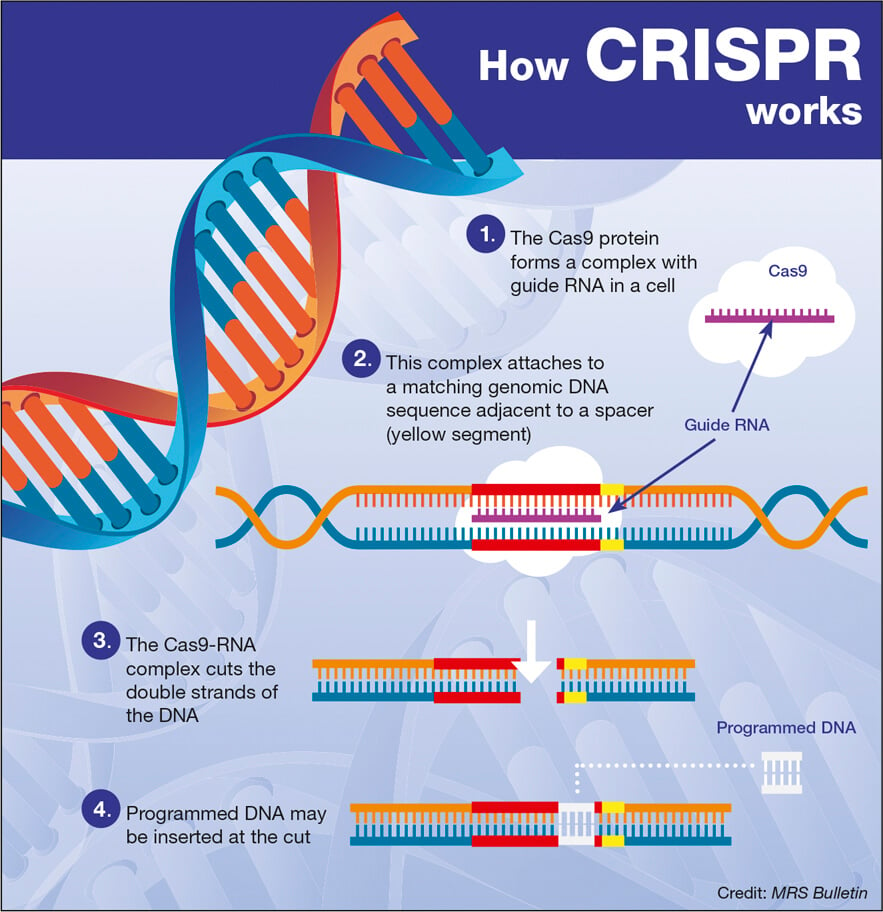
CRISPR Gene Editing: Balancing Cures and Ethical Concerns
CRISPR gene editing stands at the forefront of a revolutionary transformation in the world of genetics, offering unprecedented opportunities to alter the very fabric of life. This powerful CRISPR technology enables scientists to make precise edits to DNA, potentially curing genetic disorders such as sickle cell anemia. However, it also raises fundamental gene editing ethics concerns, as society grapples with the implications of altering human characteristics and the moral responsibilities attached to these actions. As we explore the potential of CRISPR in the quest for a sickle cell cure, we must also consider the broader implications for health justice and medical ethics. The promise of CRISPR gene editing is undeniably exciting, yet it beckons us to tread carefully amid the intricate web of ethical dilemmas that it unveils.
Gene modification and editing through techniques like CRISPR are reshaping our understanding of genetic diseases and their treatments. This innovative approach allows researchers to accurately target and change genes, potentially eradicating conditions such as sickle cell anemia. The intersection of this groundbreaking gene technology with discussions about medical ethics prompts essential questions regarding the responsibilities of scientists and society in making these changes. Additionally, the discourse surrounding health equity and justice is paramount, as access to these advancements may disproportionately benefit certain populations. As we delve into the complexities of gene editing, it is crucial to navigate the moral landscape that accompanies such profound scientific capabilities.
The Ethical Landscape of CRISPR Gene Editing
As the potential of CRISPR gene editing becomes a reality, it raises profound ethical questions that challenge our understanding of human rights and medical ethics. The core dilemma lies in whether we possess the moral authority to alter the very nature of our existence. This inquiry is further complicated by the rapid advancements in technology that enable us to eradicate genetic diseases like sickle cell anemia. The dialogue surrounding gene editing often highlights the disparity between the promise of curing debilitating illnesses and the troubling implications of playing God with human genetics.
Many experts argue that creating a framework for gene editing ethics is essential to ensure that the benefits of technologies like CRISPR are accessible to all, rather than being reserved for a privileged few. These considerations demand the integration of health justice into the conversation, ensuring that socioeconomic factors do not dictate who receives life-saving treatments. The intersection of financial implications, such as the exorbitant cost of CRISPR treatments for sickle cell, further complicates the ethical landscape, prompting discussion on the responsibilities of healthcare systems to provide equitable access.
The Promise of CRISPR Technology in Sickle Cell Treatment
CRISPR technology holds remarkable promise for individuals suffering from genetic disorders like sickle cell anemia. By employing this innovative gene editing tool, scientists can effectively target and modify the genes responsible for such debilitating conditions, providing hope for a cure. This form of treatment has the potential to not only improve the quality of life for patients but also to facilitate long-term health outcomes that were previously unimaginable. The possibility of eliminating the roots of sickle cell disease presents a paradigm shift in how we approach genetic treatment.
However, the excitement surrounding CRISPR technology must be carefully weighed against the ethical implications of its use. As Neal Baer pointed out, curing sickle cell through gene editing prompts critical questions about the extent of our intervention in nature. Will we use this technology to treat only severe conditions, or will it extend to less dangerous traits? This slippery slope raises the risk of eugenics and other forms of discriminatory practices. Thus, while the advancements of CRISPR provide a beacon of hope for sickle cell patients, they also prompt us to scrutinize the moral responsibilities that accompany such powerful capabilities.
Health Justice and Access to Gene Editing
The discussion surrounding CRISPR and gene editing technologies cannot ignore the issues of health justice and access. As treatments become available that can eradicate serious genetic diseases, the question arises: Who will have access to these groundbreaking therapies? The high cost of gene editing treatments, like the estimated $2.2 million for curing sickle cell, reveals a systemic issue within healthcare that often prioritizes profit over patient welfare. This situation raises concerns about whether only affluent individuals or communities will benefit from such advancements, leaving marginalized populations at a disadvantage.
Health justice advocates argue that equitable access must be a fundamental consideration as we move forward with gene editing technologies. It is vital for policymakers and healthcare providers to develop frameworks that ensure all patients, regardless of their socioeconomic status, can benefit from innovations in medical science. If gene editing technologies like CRISPR are to fulfill their promise of curing diseases and enhancing quality of life, we must work collectively to eliminate barriers to access and prioritize health equity in our healthcare systems.
Exploring Genetic Modification in Future Generations
As CRISPR gene editing paves the way for treatments that may alter future generations, we must confront the thought of genetic modifications extending beyond disease prevention to enhancements for traits and abilities. This perspective raises vital questions regarding parental rights and ethical boundaries in genetic selections. Should parents have the power to dictate changes in their offspring’s attributes, potentially leading to societal pressure for specific characteristics? This conversation may lead to a slippery slope where genetic modifications become a measure of worth or status, raising profound moral questions.
The implications extend deeply into social ethics as well. For instance, considering the desire of parents from the deaf community to have children with hearing capabilities invites a re-examination of our definitions of normalcy and difference. While some may argue that improving traits serves the child’s best interest, others assert that variances among individuals contribute to the rich tapestry of human experience. Thus, as we explore the capabilities of CRISPR and other gene-editing technologies, it becomes increasingly crucial to recognize the intricate balance between innovation and ethical responsibility in shaping future generations.
The Role of Regulatory Oversight in Gene Editing
One of the most pressing issues in the advancement of CRISPR gene editing is the need for appropriate regulatory oversight. As highlighted during discussions surrounding the ethical implications of this technology, the lack of stringent regulations can lead to misuse or unethical applications of gene editing. While certain laws exist to curtail practices like human cloning, the rapid pace of innovation may leave gaps that could be exploited, particularly in nations with less rigorous enforcement. Vigilant oversight must be established to prevent potential abuses of power in manipulating human genetics.
Furthermore, this oversight is essential not only for ethical compliance but also for maintaining public trust in medical advancements. If society feels that gene editing is being pursued without adequate safeguards, the acceptance of these technologies could falter. This implies that it is not enough to simply legislate against harmful practices; there must also be transparency and inclusiveness in conversations about how gene editing is applied. Involving diverse stakeholders, including ethicists, geneticists, and representatives from affected communities, is crucial in forming comprehensive policies that nurture both scientific progress and societal well-being.
The Impact of CRISPR on Disease Prevention
CRISPR gene editing presents revolutionary potential in the realm of disease prevention. By directly targeting and modifying the genetic sequences responsible for specific conditions, we could fundamentally alter the future landscape of health care. This ability to edit genes not just in somatic cells but also in germline cells means that genetic modifications could be passed down through generations, effectively eradicating hereditary diseases like sickle cell in entire family lines. Such advancements offer a glimmer of hope for families affected by genetic illnesses.
Nevertheless, the prospect of using CRISPR for disease prevention opens a wider dialogue about the moral implications of creating ‘designer babies.’ The temptation to eliminate genes associated with conditions that are not life-threatening, such as Down syndrome, raises fundamental ethical queries about the bounds of medical intervention. How do we balance the desire to prevent suffering with the value of human diversity? If we pursue editing genes under the pretext of enhancing quality of life, we tread a precarious path that can alienate those whose identities are intertwined with these very conditions.
Addressing Unforeseen Consequences in Gene Editing
While CRISPR gene editing heralds a new era of medical breakthroughs, it is crucial to consider the potential unintended consequences of such powerful technology. The complex nature of genes means alterations may ripple through various biological processes, leading to unforeseen health outcomes. As seen in past scientific endeavors, including attempts at gene manipulation, outcomes can prove unpredictable, necessitating a cautious approach to the implementation of gene editing practices. For instance, lowering cholesterol levels through genetic editing may have unforeseen interactions with insulin levels and other metabolic factors.
Additionally, as scientists venture into unexplored genetic territories, ethical oversight becomes increasingly important. There is a pressing need to invest in research that addresses both the technical outcomes and the ethical implications of gene modifications. This includes understanding how edited genes interact within the broader ecosystem of the human body and how those changes might affect future generations. Emphasizing safety and transparency in gene editing research will not only mitigate risks but also foster public confidence in the continued evolution of gene editing technology.
The Future of Genetic Engineering and Society
As CRISPR technology continues to develop, its implications stretch far beyond the laboratory and into societal contexts. The interplay between genetic engineering and social ethics presents both opportunities and challenges that society must navigate. These possibilities include not only curing genetic diseases but also enhancing human capabilities and functioning, prompting renewed discussions about what it means to be human. As these technologies emerge, society must grapple with the moral and ethical dilemmas that arise from their potential applications.
Ultimately, the future of genetic engineering will require collaboration across disciplines, including ethics, law, and medicine. Stakeholders must engage in ongoing dialogues to address the complex questions arising from advancements in CRISPR technology. By fostering an inclusive conversation, we can help ensure that the developments in genetic engineering benefit humanity as a whole, while also respecting individual rights and promoting health equity. Only through careful consideration and ethical foresight can we harness the power of CRISPR to shape a healthier future for all.
Frequently Asked Questions
What are the ethical considerations of CRISPR gene editing in medicine?
CRISPR gene editing raises significant ethical concerns, particularly about the implications of altering human genetics. Key issues include deciding who has the right to make genetic modifications, the potential for ‘designer babies,’ and the impact on human diversity. Moreover, financial and health equity concerns are prominent, as innovative treatments like those for sickle cell can be prohibitively expensive, raising questions about access and fairness in healthcare.
How does CRISPR technology help in curing sickle cell disease?
CRISPR technology allows scientists to edit specific genes responsible for sickle cell disease. By targeting and correcting the faulty gene in somatic cells, patients can be effectively cured of this painful condition. This breakthrough presents a promising avenue for treatment and highlights the potential of CRISPR in addressing genetic disorders.
What is meant by germline editing in the context of CRISPR gene editing?
Germline editing involves making changes to the genetic material in gametes or embryos, which can be passed down to future generations. In the context of CRISPR gene editing, this means altering genes at the embryonic stage to prevent genetic diseases like sickle cell from occurring in the first place. While this technology holds great promise, it also raises profound ethical questions about the implications of such irreversible changes.
What are the potential risks associated with CRISPR gene editing?
While CRISPR gene editing offers revolutionary possibilities, it carries risks such as unintended genetic consequences, off-target effects, and long-term health impacts that aren’t yet fully understood. The intricate evolution of genes means that editing one gene can disrupt multiple biological processes, leading to unforeseen health issues.
How does the CRISPR technology impact health justice and equity?
The implementation of CRISPR gene editing raises questions about health justice and equity, particularly with regards to access to groundbreaking treatments. High costs associated with technologies like sickle cell cures could widen the gap between those who can afford genomic therapies and those who cannot, potentially exacerbating existing health disparities.
What role does medical ethics play in the use of CRISPR for gene editing?
Medical ethics are crucial in the discussion of CRISPR gene editing, especially concerning informed consent, the ramifications of gene modification, and the obligations of healthcare professionals towards their patients. Ethical discussions guide how society chooses to utilize these powerful technologies while reflecting on the broader impacts of modifying human genetics.
Can CRISPR technology be used for enhancements beyond disease treatment?
Yes, CRISPR technology holds potential for enhancements beyond treating diseases, sparking debates around the morality of creating ‘designer’ traits in humans, such as intelligence or physical abilities. These enhancements raise significant ethical questions about the natural variation in humans and the concept of ‘normalcy’.
What are the concerns regarding oversight in CRISPR gene editing practices?
Concerns regarding oversight in CRISPR technology include the adequacy of existing regulations and monitoring worldwide, especially in countries like Russia or China, where practices might not adhere to international ethical standards. The lack of consistent global governance raises alarms about the potential for abuse in gene editing.
What is the significance of CRISPR gene editing in addressing genetic disorders?
CRISPR gene editing is significant in addressing genetic disorders as it offers a precise method for correcting genetic mutations that lead to diseases. This technology not only presents potential cures but also challenges existing ethical frameworks that govern medical practice and the definition of health.
| Key Aspects | Details |
|---|---|
| Topic | The Promise and Peril of CRISPR, discussing the ethics and potential of gene editing. |
| Speaker | Neal Baer, Co-director of Harvard’s Media, Medicine, and Health program. |
| Central Question | Is it ethical to edit human genes, particularly for diseases that are not life-threatening? |
| Potential Benefits | CRISPR allows for the curing of sickle cell anemia by editing somatic cells. |
| Financial Concerns | The treatment costs approximately $2.2 million, questioning who will pay. |
| Ethical Dilemmas | Should gene editing extend to non-life-threatening conditions like Down syndrome? |
| Oversight Issues | Lack of monitoring for gene editing practices in countries like Russia and China. |
| Long-Term Effects | CRISPR may cause unforeseen consequences due to the complexity of genetic interactions. |
Summary
CRISPR gene editing presents groundbreaking possibilities in medicine, particularly in curing genetic disorders such as sickle cell anemia. However, it also raises complex ethical questions about the implications of editing human DNA. As we navigate this promising yet perilous landscape, it is crucial to consider not only the effectiveness of genetic modifications but also the moral responsibilities that come with such power. With significant financial implications and the risk of exacerbating health disparities, the ongoing dialogue around CRISPR gene editing must prioritize ethical oversight to ensure equitable benefits for all.


